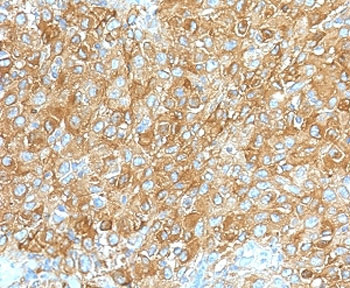- Tel: 858.663.9055
 Email: info@nsjbio.com
Email: info@nsjbio.com
- Tel: 858.663.9055
- Email: info@nsjbio.com
Late Endosome Marker Antibody detects proteins associated with late endosomes, dynamic vesicular compartments within the endocytic pathway. Late endosomes form as early endosomes mature, acquiring specific markers and acidic pH, before progressing to lysosomes. They play critical roles in cargo sorting, protein degradation, receptor recycling, and signal regulation.
Markers commonly identified with Late Endosome Marker Antibodies include Rab7, LAMP1, LAMP2, CD63, and VPS proteins. Rab7 is a key regulator of endosomal maturation, while LAMP1 and LAMP2 mark late endosomal and lysosomal membranes. CD63, a tetraspanin, is widely used as a marker of late endosomes and exosomes. The Late Endosome Marker Antibody enables researchers to accurately identify late endosomal compartments, analyze trafficking pathways, and explore their contributions to cellular function.
Because late endosome dysfunction is linked to neurodegeneration, infection, cancer, and lysosomal storage disorders, Late Endosome Marker Antibodies are vital tools in both basic and translational biology.
NSJ Bioreagents provides Late Endosome Marker Antibodies validated for immunohistochemistry, immunofluorescence, western blotting, ELISA, and flow cytometry. Each Late Endosome Marker Antibody undergoes rigorous validation to confirm specificity for late endosomal proteins while minimizing cross-reactivity with early endosome or lysosomal markers.
By choosing a Late Endosome Marker Antibody from NSJ Bioreagents, researchers gain access to reagents optimized for reproducibility. Our antibodies deliver clear immunostaining of intracellular compartments, reliable detection in protein lysates, and consistent performance in multiplex assays. With detailed datasheets, recommended controls, and application protocols, NSJ Bioreagents ensures that Late Endosome Marker Antibodies provide dependable results across discovery research and clinical translation.
The Late Endosome Marker Antibody is used in a wide range of applications, reflecting the central role of late endosomes in cell biology.
Late Endosome Marker Antibodies identify proteins that regulate cargo sorting and vesicle maturation.
The Late Endosome Marker Antibody supports analysis of receptor recycling and degradation pathways.
Researchers use Late Endosome Marker Antibodies to distinguish late endosomes from early endosomes and lysosomes.
The Late Endosome Marker Antibody is applied to study trafficking defects in Alzheimer’s, Parkinson’s, and Huntington’s disease.
Late Endosome Marker Antibodies highlight accumulation of cargo in models of lysosomal storage disorders.
Researchers use the Late Endosome Marker Antibody to evaluate how endosomal dysfunction contributes to synaptic decline.
Viruses such as HIV, influenza, and coronaviruses exploit late endosomes for entry and replication.
Late Endosome Marker Antibodies are used to track pathogen trafficking within host cells.
The Late Endosome Marker Antibody supports studies of bacterial toxins that hijack vesicular pathways.
Late Endosome Marker Antibodies help study altered trafficking in tumor cells.
The Late Endosome Marker Antibody is applied to investigate exosome biogenesis and tumor communication.
Researchers use Late Endosome Marker Antibodies to identify biomarkers of aggressive cancer phenotypes.
Late Endosome Marker Antibodies track vesicle fusion events in autophagy.
The Late Endosome Marker Antibody highlights pathways connecting late endosomes to lysosomes.
Researchers apply Late Endosome Marker Antibodies to measure defects in degradation machinery.
The Late Endosome Marker Antibody validates therapeutic strategies aimed at correcting endosomal trafficking.
Late Endosome Marker Antibodies support biomarker discovery for neurodegenerative and lysosomal storage diseases.
The Late Endosome Marker Antibody is used in high-content imaging platforms for compound screening.
Late endosomes are critical for cellular homeostasis, signaling, and defense. The Late Endosome Marker Antibody enables precise identification and study of these compartments, while Late Endosome Marker Antibodies more broadly advance research across neurobiology, oncology, immunology, and translational medicine.
In basic research, Late Endosome Marker Antibodies clarify mechanisms of cargo sorting and vesicle fusion. In disease models, the Late Endosome Marker Antibody reveals trafficking defects driving pathology. In drug discovery, Late Endosome Marker Antibodies validate therapies targeting vesicular transport.
Clinically, proteins localized to late endosomes are emerging as biomarkers for neurodegeneration and cancer. The Late Endosome Marker Antibody connects fundamental cell biology with translational advances, supporting precision approaches to diagnosis and therapy.
Late endosomes integrate endocytosis, signaling, and degradation. The Late Endosome Marker Antibody provides researchers with a reliable tool to study these compartments, while Late Endosome Marker Antibodies more broadly support discoveries in neurobiology, oncology, infection, and translational research. By bridging molecular cell biology with clinical relevance, these antibodies remain essential for advancing biomedical discovery and improving human health.

IHC staining of FFPE human prostate carcinoma tissue with recombinant CD63 antibody (clone CDLA63-2R).